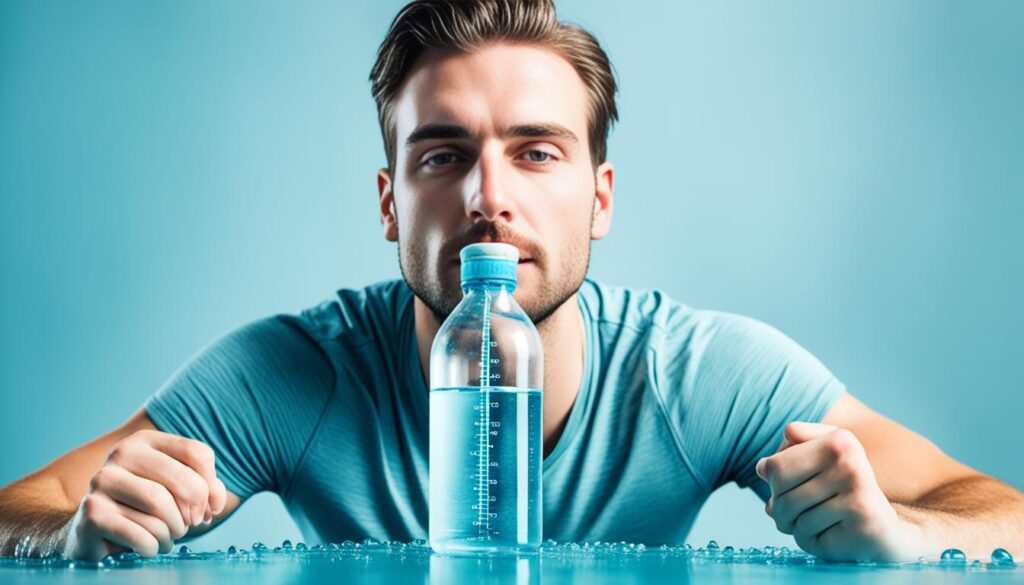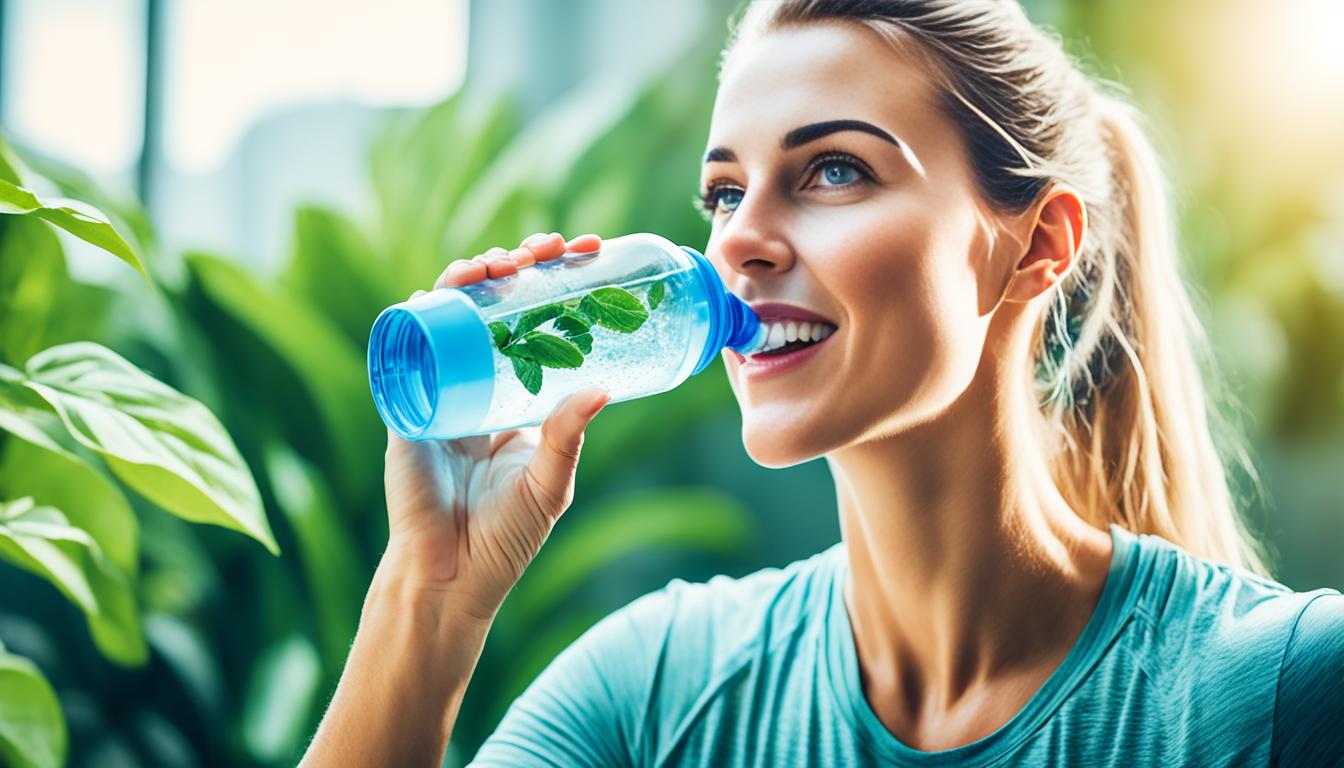Fasting has hit big in recent times. People are trying it for health perks like shedding pounds, better digestion, and clearer thinking. Whether you fast for religious purposes (like during Ramadan or Lent) or for your own health goals, staying hydrated while water fasting is key for a safe and beneficial journey.
When you fast, your body goes through big changes. This increases stress on your body. It’s super essential to keep your water level balanced. This helps run your body’s vital processes right and avoids nasty dehydration signs like dry mouth, headaches, fatigue, dizziness, constipation, and bloating. Keeping well-hydrated before, during, and after your fast makes it easier for your body to handle the fasting process.
We’re going to dive into why hydration while water fasting is so important. We’ll talk about water’s part in body functions, the dangers of dehydration, and tips for keeping your fluids and electrolytes balanced. Plus, we’ll explain how you can check your hydration by looking at urine color. We have special advice for those fasting during Ramadan too. Following these key points will make your fasting experience better and help you stay healthy.
The Importance of Hydration During Water Fasting
It’s key to stay hydrated during water fasting for good health and body work. Water is important for managing body temp, helping joints move, aiding digestion, taking out waste and toxins, and moving nutrients around. Drinking lots of water is vital when you’re on a water fast. It keeps you hydrated and cuts down dehydration risks.
During a water fast, you only drink water because no eating is allowed. These fasts usually last from 24 to 72 hours. It’s not wise to do a water fast longer than this without a doctor’s advice. Although fasting can have health perks like autophagy or controlling blood pressure, you need to focus on staying hydrated to dodge bad side effects.
Role of Water in Bodily Functions
Our body needs water for many things, like:
- Regulating body temperature
- Lubricating joints
- Supporting digestion
- Removing waste and toxins
- Transporting nutrients
Enough water keeps these roles working well, even in a fast. If you don’t drink water, it can cause health trouble and harm your well-being.
Risks of Dehydration While Fasting
One risk of water fasting is dehydration. Without food, your body struggles to hold onto water. This can lead to issues like:
- Headaches
- Dizziness
- Fatigue
- Dry mouth
- Constipation
If dehydration gets really bad, it might cause fainting, seizures, or harm to your brain. To stay safe, make sure to drink water as needed during your fast.
| Risks of Dehydration | Prevention Methods |
|---|---|
| Headaches, dizziness, fatigue | Drink plenty of water throughout the day |
| Dry mouth, constipation | Sip on water regularly, even if not thirsty |
| Fainting, seizures, brain damage (severe cases) | Check urine color and drink if it gets dark |
Focus on staying hydrated during a water fast to lower dehydration risks and have a better fasting journey. Always pay attention to what your body tells you, and talk to a doctor before starting a fast, especially if you’re not in great health.
How Fasting Affects Hydration Levels
Fasting changes how the body manages water. It can throw off the usual way our bodies hold and use fluids. For those who fast, it’s crucial to learn how these changes happen. Then, you can keep your hydration at a healthy level.

Reduced Fluid Intake from Food Sources
Many people get about 20 percent of their daily fluids from food. Foods like oatmeal and watermelon have lots of water in them. But, when fasting, you miss out on this extra water unless you drink more.
Glycogen Depletion and Water Storage
Another impact of fasting is how it affects your body’s storage of carbs. Your body stores carbs as glycogen. For every gram of glycogen, there’s also 3 grams of water stored. In the beginning of a fast, as your body uses up these stores, it releases water into your blood. But, after these stores are used up, your body can’t rely on this extra water. So, it’s super important to drink more water as you continue fasting.
| Fasting Duration | Effect on Hydration | Recommendations |
|---|---|---|
| Short-term (12-16 hours) | Minimal impact on hydration levels | Maintain normal water intake |
| Intermediate (24-72 hours) | Glycogen depletion releases water, but stores are limited | Increase water intake by 20-30% |
| Prolonged (72+ hours) | Glycogen stores depleted, increased risk of dehydration | Monitor hydration closely, drink water regularly, consider electrolyte supplementation |
The effects of fasting on hydration level can change. Factors like how long you fast, how your body works, and where you are can have an impact. So, when fasting, always pay attention to your body. This will help you figure out if you need to drink more water. By doing this, you’ll have a better fasting experience.
Estimating Your Fluid Needs During a Water Fast
Starting a water fast? Keep your body hydrated. You need to figure out how much water to drink. A dietitian named Nicole Grant says you should drink 30–35 mL of water for every kilogram you weigh. Adjust this amount to fit your body’s needs.
Your water needs depend on several things. Things like how much you weigh, if you exercise a lot, where you are, and any medicines you take play a big part. If you work out, live where it’s hot, or take certain meds, drink more water. This keeps you healthy.
Feeling thirsty doesn’t always mean you need to drink. Sometimes we’re too busy to notice we need water. To figure out how much water you need, use this formula:
- Change your weight from pounds to kilograms by dividing by 2.2.
- Then multiply your weight in kilograms by 0.033. This gives you the water amount you need in liters every day.
So, say you weigh 150 pounds (68 kg). You should drink about 2.24 liters of water a day during your water fast (68 × 0.033 = 2.24).
At least 64 ounces (1.9 liters) of water a day is a good rule during a water fast. But, this can change based on your weight, how active you are, and where you are.
It’s also key to watch for signs that your body is losing water. These signs include:
- Feeling thirsty
- Having a dry mouth and lips
- Urinating dark urine
- Feeling tired and lightheaded
- Getting headaches
Here are some more tips for staying hydrated during a water fast:
| Tip | Description |
|---|---|
| Drink water regularly | Always keep water with you and take small sips throughout the day |
| Sip slowly | Drinking water slowly helps your body use it better |
| Infuse water with flavors | Make water tastier by adding lemon, cucumber, or mint |
| Listen to your body | Pay attention to when you’re thirsty and other hydration signs |
| Monitor urine color | Look out for a light yellow urine color as a sign of good hydration |
| Avoid intense exercise | Don’t do heavy workouts that make you sweat a lot |
| Rest and relax | Give your body plenty of breaks and rest time |
Know your water needs and use these tips. This will help you stay healthy and well-hydrated during your fast.
Maintaining Electrolyte Balance While Fasting
During a water fast, keeping your body’s electrolytes in check is key. These nutrients help run your body’s systems. Yet, fasting can lower your electrolyte levels. So, it’s important to keep them balanced for a safer fast.

Essential Electrolytes: Sodium, Potassium, Magnesium, Zinc, and Calcium
Focus on getting enough sodium, potassium, magnesium, zinc, and calcium during your fast. These minerals help keep you hydrated and your body working right. Eat foods rich in electrolytes like this:
- Sodium: Use sea salt, pickled veggies, and drink bone broth
- Potassium: Enjoy bananas, avocados, spinach, and coconut water
- Magnesium: Snack on nuts, seeds, greens, and have dark chocolate
- Zinc: Try oysters, beef, pumpkin seeds, and lentils
- Calcium: Have dairy, greens, and canned fish with bones
Normally, stick to whole foods for your electrolytes. But, sometimes you might need supplements. This is true if you fast a lot or have health issues. Always talk to a doctor about what you need.
Signs and Symptoms of Electrolyte Imbalance
Knowing when your electrolytes are off is important. Signs can include:
- Headaches
- Heart palpitations
- Lightheadedness or dizziness
- Muscle cramps or weakness
- Fatigue or lethargy
If these signs show up, your electrolytes might be off. Adjust what you’re eating. If it doesn’t help or gets worse, stop fasting and get help.
| Electrolyte | Recommended Daily Intake During Fasting |
|---|---|
| Sodium | 250-450 mg |
| Potassium | 5-8 milli-equivalents (MEQ) |
| Magnesium | 70-120 mg |
Focusing on your electrolytes can help you fast safely. It reduces problems and keeps you feeling good. Always check with a doctor if you’re unsure or have health problems.
Hydration While Water Fasting: Monitoring Urine Color
When you’re on a water fast, tracking your hydration is key for staying healthy. A simple trick is to look at the color of your urine. This can tell you a lot about your body’s water level. By adjusting your drinking based on your urine color, you can keep your hydration in check during the fast.
Urine Color as an Indicator of Hydration Status
Your urine can be clear, light yellow, or dark yellow. What it looks like shows how much water is in your body. Light yellow to clear urine means you’re probably getting enough fluids. But, dark yellow or amber urine could be a sign you’re dehydrated. Your body is holding onto water and making strong urine.
If you take some medicines or eat certain foods, your urine color might change. Always talk to your doctor if you’re unsure about what’s affecting your urine color and hydration. They can give you advice tailored to your situation.
Optimal Urine Color During Fasting
While fasting, you want your urine to be light yellow or clear. This happens when you’re drinking enough water. If your urine is getting darker, you should drink more to avoid becoming dehydrated.
But, be careful not to drink too much water. If your urine is always clear, you might be overhydrated. This can throw off your body’s salt balance. Finding the right amount of water to drink is crucial for a safe and effective fast.
| Urine Color | Hydration Status | Recommended Action |
|---|---|---|
| Clear | Overhydrated | Slightly reduce fluid intake |
| Light straw color | Well-hydrated | Maintain current fluid intake |
| Yellow | Mildly dehydrated | Increase fluid intake |
| Amber or dark yellow | Dehydrated | Significantly increase fluid intake |
Watching your urine color and adjusting your water intake helps keep you hydrated while fasting. Good hydration supports your health, lowering risks of dehydration symptoms like headaches or tiredness. Always remember, staying properly hydrated is critical for a successful and safe water fast.
Hydration Tips for Religious Fasting (Ramadan)
Millions of Muslims worldwide fast from dawn to sunset during Ramadan. Proper hydration is key during this time to stay healthy. Here are some tips for staying hydrated:
Proper Hydration During Suhoor and Iftar
Drink 2-3 glasses of water at Suhoor, the meal before sunrise. Also, eat water-rich fruits and vegetables. When you break your fast at Iftar, start with water, coconut water, or water with lemon, mint, or cucumber. Don’t wait to drink until you feel thirsty. By then, you’re already dehydrated.
It’s dangerous to drink a lot of water quickly at Iftar because it can lead to water intoxication. Instead, drink water slowly throughout the evening. Your body needs around 20 minutes to feel full, so take your time drinking.
Choosing Hydrating Foods and Beverages
Include water-rich foods in your Suhoor and Iftar meals. This list includes:
- Fruits like watermelon, berries, and citrus fruits
- Vegetables such as cucumbers, lettuce, and zucchini
- Soups and stews
- Yogurt and smoothies
Don’t forget about electrolyte-rich foods. They help you stay hydrated. These foods include bananas, avocados, dates, and nuts.
Be careful with caffeinated and sugary drinks, as they can dehydrate you. Stick to water, herbal teas, or low-fat milk instead.
Sehri should include whole grains, fresh fruits, protein, and healthy fats to keep your energy up.
Change your exercise routine during fasting to avoid dehydration. Pick light activities like walking or stretching. Try to work out when it’s cooler or after Iftar.
| Hydration Tips | Suhoor | Iftar |
|---|---|---|
| Drink water | 2-3 glasses | Drink throughout the evening |
| Choose water-rich foods | Fruits, veggies, grains, protein, and fats | Also include electrolyte-rich foods |
| Choose Your Beverages Wisely | Water, herbal teas, low-fat milk | Also, have water and limit caffeine and sugar |
If you find fasting hard or are worried about hydration, talk to a dietitian or doctor. Remember, some people, like young children or those who are sick, don’t have to fast.
Ramadan is about spirituality, community, and discipline. Take care to eat and drink well during Suhoor and Iftar. This helps support your health while you fast.
The Role of Water Filters in Promoting Hydration
An advanced water filter, such as Sküma’s countertop reverse osmosis system, boosts the quality and taste of your water. This leads to more drinking, especially during times like fasting. Water filters take out bad stuff and leave refreshing water. This clean water improves hydration, which is key for better health. Studies show that clean water helps the body get rid of harmful chemicals. This is vital during fasting.
Adding a water filter to your routine, whether during fasting like Ramadan or daily life, is a smart move. The Sküma filter makes water super clean. These filters help water soak into your body better. This makes you hydrated at a deep level. Filtered water has been linked to better thinking and mental clearness during fasting.
Sküma’s system does more by putting back helpful minerals and vitamins. Before, during, and after fasting events like Suhoor and Iftar, it ensures you drink the best water. During fasting, cellular repair is triggered. Adding quality water to fasting helps with this, leading to benefits like losing weight, tweaking metabolism, and cutting down diabetes risks.




